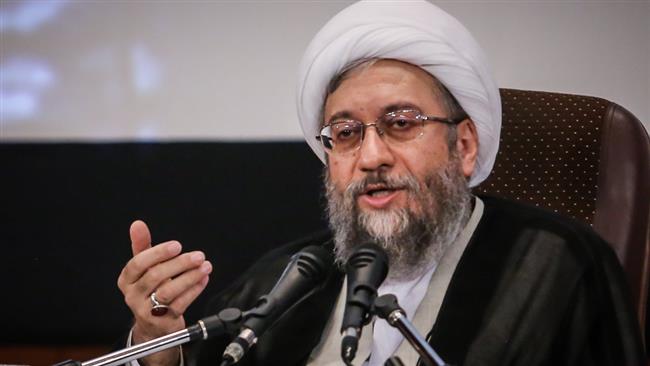LATEST
Iran’s judiciary head Sadeq Larijani is the latest high-level official to send out a tough message both to “terrorists” and to countries such as the US, Saudi Arabia, and Israel.
Larijani said of Sunday’s missile attacks inside Syria, Iran’s first in the country’s 75-month conflict: “[They were] a display of a corner of Iran’s defensive capability and the Islamic Republic’s power and firm determination to fight terrorism.”
The Revolutionary Guards have put out varying numbers of supposed success for six Zulfiqar missiles, fired from western Iran at the Islamic State in eastern Syria. Numbers of claimed ISIS fatalities have fluctuated from 50 to 300 to 170.
However, no evidence has been produced of damage or casualties, and Israeli officials have derided the attacks, saying only one of seven missiles hit the target, with three falling inside Iraq.
See Iran Daily, June 21: Was Tehran’s Missile Attack In Syria A Dud?
Still, Larijani was firm in his declaration that “terrorists and their international and regional sponsors have properly received this clear message that their despicable efforts to destabilize a country which enjoys the highest level of security in the region will be met with serious and crushing responses”.
He said should no groups should test Iran’s defensive power, because the attempt would cost them “very dearly”.
Iranian officials, beginning with the Supreme Leader, have stepped up their rhetoric in the past month. They have been spurred by Donald Trump’s visit to Saudi Arabia, by the June 7 ISIS-claimed attacks inside Tehran, and by the prospect of additional sanctions adopted by the US Congress.
President Hassan Rouhani and Foreign Minister Mohammad Javad Zarif have dropped their foreign policy of engagement, joining the denunciations of the US, the “Zionist regime”, and Saudi Arabia.
See Iran Daily, June 16: “US Should Worry About Saving Its Own Regime”
Video: Khamenei’s Slapdown of Rouhani Over Economy and Division
A video of the Supreme Leader pointedly criticizing President Rouhani is circulating widely on YouTube.
In a speech last week, Ayatollah Khamenei chided Rouhani — re-elected in May — on both economic and political matters:
Mr President has talked at great lengths about the country’s economy and well, he’s said, ‘This should be done’, ‘That should be done’. But who is he addressing by mentioning the ‘should dos’? Himself.
As the audience laughed and Rouhani smiled uncomfortably, Khamenei continued: “In 1980-1981 the then-President {Abolhassan Banisadr, impeached by Parliament] polarised society in two camps, and divided the country into opponents and supporters; this should not be repeated.”
Khamenei’s office supported Rouhani’s opponent, hardline cleric Ebrahim Raisi, in the election. During the campaign, the Supreme Leader issued a series of statements to keep Rouhani “in his box” should the President retain office.
On Wednesday, Khamenei repeated his denunciation — launched during the campaign on May 7 — of the UN’s Education 2030 program for access to global learning. He declared that the initiative is an attempt by some countries to make “all of the world think and act the way they want”, undermining the Islamic Republic.
The Rouhani Government had embraced the program, with President meeting UNESCO head Irina Bukova, but has been forced to step back from it by Khamenei’s criticism.
Rouhani may have spurred the Supreme Leader’s latest comments with his statement on June 14 that both the founder of the Islamic Republic, Ayatollah Khomeini, and Ayatollah Khamenei “have endeavored to listen to the people’s voice”, implying that Khamenei should pay attention to the 24 million people who voted for Rouhani on May 19.
After harsh criticism, Rouhani backed away on Tuesday, recognizing the supremacy of the Supreme Leader, “Monotheism, divine revelation, Imamah [the 12 Shia imams as the rightful successors to Prophet Mohammad], and divine justice are not subject…to elections.”

